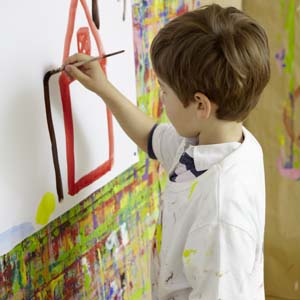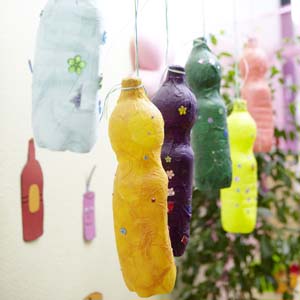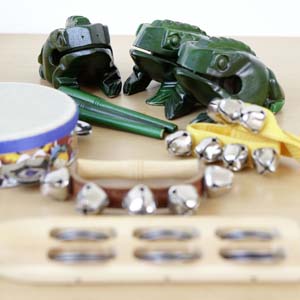


Painting and art work are further important forms of expression for children beside verbal skills. They can express feelings, experiences or issues that are important to them – no need to look for the right words. For younger children, painting, shaping and designing are a first way of noticing that they can make things happen.
Every nursery group room has an atelier where children can experiment with different materials and techniques.
Sounds, rhythms and melodies are always part of our day-to-day work.
You can listen to music in singing groups (within and across groups), lying on the changing table or falling asleep. There are so many different kinds of music that almost no child can resist singing along or imitating it. Music is language, expression and movement in one.
It creates the ideal basis for social interaction, in both small and large groups. In the singing groups music plays a very important role. Instruments are also available for the children to practise with on their own.
THE ATELIER
Painting in the atelier does not mean having to produce works of art. We want all of our children to find their own way of expressing themselves, which is very important for encouraging a well-balanced personality. During free painting in the Closlieu, the children can do as they wish in their play area (the piece of paper) – as long as they abide by one or two rules that facilitate interaction in the painting group.
They can use the colours that are important to them, they have the chance to repeat things as often as they wish, they decide themselves what to put on paper – and no child ever says: “I don’t know what to paint.”
This type of free expression can only happen when children are confident that what they paint or draw will not be assessed, commented on, interpreted or compared. We provide this kind of safe space (the Closlieu) for our children in our art classes.
If children are given the opportunity to develop certain symbols for themselves, to formulate them (without our anticipating any stages in development by showing them what to do or painting things for them to copy), all of those symbols will remain with them, they will never unlearn them.
Christiane Augustin-Malysz – Degree in Social Work, trained in expressive semiology and supervising the Closlieu (Arno Stern, Paris)
MUSIC EDUCATION
All children enjoy music and dance. They play with their voices, love how their bodies move and enjoy getting their hands on anything that makes a noise. They learn rhymes and songs, rhythms and melodies. They make them theirs and sometimes change them on their own. Preschool music lessons develop and systematically encourage the innate talents of every child. An early musical start can make a positive contribution to the overall development of the child.
In class, we present music to children in a playful fashion, letting them experience it with their senses and realise it as an important part of life. For children, a holistic experience of music means:
- Singing
- Dancing
- Speaking
- Movement
- Dramatic play
- Playing instruments (Orff Schulwerk instruments )
- Listening to music
- Becoming familiar with traditional instruments
- Learning musical basics


